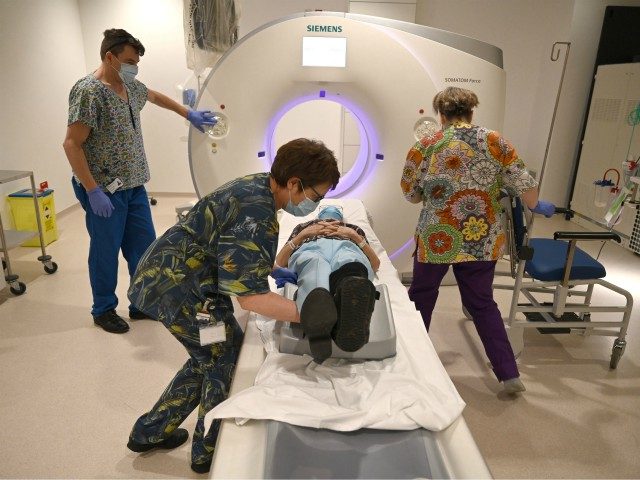There were at least 4.4 million fewer scans between April and September, many of which could have been life-saving, after the National Health Service (NHS) was told in March to cancel all non-essential appointments because of the Chinese coronavirus.
Analysis conducted by the BBC found that ultrasounds and CT and MRI scans fell by one-third during that period.
NHS England also admitted that the backlog for services is so great that one-in-seven people waiting for a scan have been on the list for more than three months.
Cancer Research UK warns that the delays could mean more people presenting to medical services in a worse condition than they would have had they been allowed to seek treatment earlier.
Just last week, for example, father of two Sherwin Hall died of cancer. Mr Hall had repeatedly begged the hospital in April and May for an MRI scan, but said he was told he “couldn’t get one because scanning services were slowed down because of the coronavirus”. His widow said that had he received the examination, he would be alive today.
The Royal College of Radiologists (RCR) and the British Institute for Radiology (BIR) had said that a lack of radiologists and radiology equipment at the socialised hospitals had contributed to the long waiting lists.
Hospital administrators had also pulled radiologists off their usual rota for backup to handle coronavirus infections.
The true health cost of pivoting much of the National Health Service’s resources towards coronavirus, while neglecting other medical interventions, including those related to cancer, has been coming to light in recent months.
Last month data revealed that the number of NHS patients waiting more than a year for treatment was at its highest in 12 years, with the health service admitting it was due to prioritising coronavirus.
Healthcare analysis firm Dr Foster reported in October that during the height of the pandemic admissions were down across the board, including for prostate cancer (down by 64 per cent), bowel cancer (39 per cent), and breast cancer (30 per cent).
Separate reports revealed that hospital chemotherapy attendance dropped by 66 per cent in April, while urgent referrals for early cancer diagnosis fell by up to 89 per cent.
Dr Foster said that the effects of the pandemic on medical treatments was “likely to be far-reaching, with a future spike in demand possible due to missed diagnoses and postponed procedures”.
“Cancers may now require a greater level of treatment, or even be untreatable, if they have been left undetected or untreated as a result of the crisis,” the firm added.
July predictions pointed to some 35,000 excess deaths to cancer alone within a year, due to the effect the Chinese virus was having on the NHS.

COMMENTS
Please let us know if you're having issues with commenting.